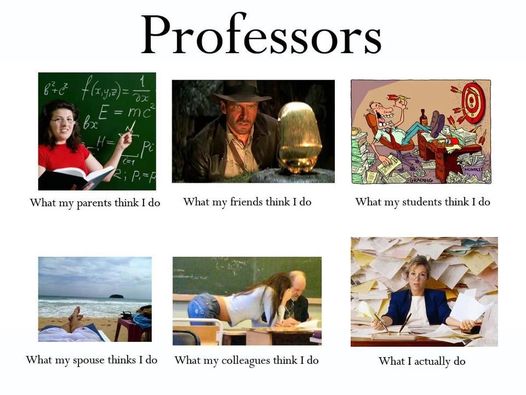|
Written by Michelle Hammond Memes that illustrate what various people think have been popping up all over the place for just about every occupation under the sun. Why have they become so popular? They are fun. They make us laugh. But they also reveal some truth. They present an opportunity to take a light-hearted approach to a few things that are rather deep.
1) Big differences can harm relationships. We might laugh that our spouse thinks we’re lounging on the beach when we’re really buried in a pile of papers, but those misconceptions, when left to fester can create real rifts in our relationships. While it might not be possible for everyone to have a complete understanding of what everyone else is doing, working towards clarification with those who matter most can be extremely useful. What your boss thinks you do matters. What your co-workers think you do matters. What your family thinks you do matters. Take some time to see yourselves through the eyes of others. 360-degree feedback is a great way to do this – in work, in the community, and at home. And most importantly use that information to spark meaningful discussions about expectations, commitments, and opportunities to learn and grow. 2) They create a shared sense of identity for those who share that occupation. Knowing that I have a shared experience of being misunderstood a “college professor with the summers off” strengthens my tie with other college professors as we examine our jam-packed summer to do list. 3) They highlight that our identities are both personally and socially influenced. For many, the link between what others think we do, and who others think we are is tight. Our own sense of identity - who we are, what we do, and our value - is in part, determined by what other people think of us. Of course, the degree to which others influences our sense of self varies from person to person and across our life stages, but undeniably, our identity is both personally and socially influenced. We need to work towards a more accurate understanding of how others view what we do and how we come across as well a solid sense of who we are that doesn’t fluctuate based on others’ changing perceptions. What do others think you do?
0 Comments
.Yesterday, Villanova beat the University of Michigan in the NCAA Final Four championship game. Scanning through media attention of the game, the focus appears to be on two key people largely made responsible for that win: Villanova’s head coach, Jay Wright, and star player, Donte DiVincenzo.
Coach Wright led Villanova’s second championship win in three years. He even looks like a celebrated hero in his tailored suits and Clooney-like countenance. DiVincenzo has been described as “The Michael Jordan of Delaware” and was nominated the Most Outstanding Player of the Final Four. How much of Villanova’s win was down to this coach and star player duo? A good deal, according to what I’ve seen in the news. However, the abilities and dynamics of the other team members, the assistant coaches, the resources invested, and even the fans themselves also contributed to the win. Perhaps Michigan didn’t step up as much as they could have, giving Villanova that much more of an edge. However, we’re less likely to see these contextual factors mentioned in reports of the win. Why? We can get caught up in a romantic idealized view of leadership. We want a hero. We want someone to be responsible. We love a good hero or villain story! Perhaps this year’s scandals in the NCAA built up our need for a hero—a beacon of light in dark basketball times. However, we see this all the time in the media, in our workplaces, communities, families, and even in ourselves. The question becomes: “How much does leadership matter?” How much do CEOs, presidents, coaches, and leaders influence outcomes in sports, communities, and businesses? It can be difficult to pin down an exact answer to that question, but it’s clear there are dangers in giving more to their contribution than what’s due. The romance of leadership represents a bias in explaining outcomes in which we over-attribute outcomes to leaders and their leadership. Leaders take credit for success and we grant that to them. We blame them for failures that may or may not be within their control. We want someone to be responsible. However, there are a few dangers in holding a highly romanticized view of leadership:
At the end of the day, does leadership matter? Do we need strong leaders? Absolutely! Not just for what they do themselves, but also for their influence in recruiting good people and bringing out the best in them, and for shaping an environment in which everyone can thrive. But these points should be moderated by an awareness of the dangers of a highly romanticized and heroic view of leadership. Written by Michelle Hammond Photo by Ricardo Gomez Angel Last minute deadlines. Public speaking. Big events to plan. Traffic. Job interviews. Computer viruses. Audits. Micromanaging bosses. Buying a new car. Moving houses. Conflict with co-workers. Budget cuts. Jammed photocopiers. Are you feeling a bit stressed reading through this list? Yeah, me too! Stop for a moment and consider the nature of stress. When you think about stress, what are your thoughts? Is stress something that is always bad? Something to be avoided? Or can there be benefits or opportunities for growth?
Stress comes with a host of negative consequences, no doubt about it: headache, heart disease, reduced immune system, digestive problems, anxiety, depression, relationship strain, and the list goes on. But have there also been times in which our stress response can lead us to perform better, to overcome challenges, to connect with other people, and to grow. In research, we distinguish three related concepts: stressor, stress, and strain. Stressors are demands from the environment (i.e. the list above), stress is our momentary response to those demands when we think they tax us or exceed our abilities, and strain is the effect it takes on us over time. Stressors generally lead to stress which generally leads to strain. BUT it’s not inevitable. And that’s the key here. Stress researchers have recently discovered that how we think about the nature of stress affects how we respond to it and the long-term effect it has on us (strain). We can think about stress as something always bad that leads to bad outcomes (stress-is-debilitating mindset) or it can bring about positives as well (stress-is-enhancing mindset). Research shows that more positive views of stress (stress-is-enhancing mindset) relate to more positive physiological and behavioral outcomes such as openness to feedback, cognitive flexibility, and life satisfaction (Crum et al., 2013; Crum, et al., 2017). Stress mindset has significant effects on both physiological outcomes such as cortisol reactivity and behavioral outcomes such as the desire for feedback under stress (Crum, Salovey, & Achor. 2011; Crum et al. 2013). People holding a stress-is-enhancing mindset experienced greater increases in levels of anabolic hormones, which are associated with growth, and experience increases in positive affect and greater cognitive flexibility compared to those with a stress-is-debilitating mindset (Crum, et al., 2017). Here are two excellent videos by the leading health psychologists and researchers summarizing this research:
In my own research, we found that holding a stress-is-enhancing mindset was beneficial for job satisfaction and turnover intentions. Specifically, the negative relationship between work-family conflict and job satisfaction was significantly less pronounced for people who believed stress could have benefits. And they were also better able to see the benefits of participation in both roles, work-family enrichment. So it helped reduce the negative effects of the bad things and augmented the good! Win-win! The good news is that this isn’t something that you’re born with. You can change your mindset towards stress. This past year has objectively been a stressful one for me: I started a new job, managed the logistics of an international move, managed my three kids’ emotional needs through the transition, and supported my husband in his job search. And let’s not forget the smaller ways too – weaning my kid of a pacifier, trying to make new friends in a new city, and deal with the daily hassles of life. I admit there have been so many moments where I made stress my enemy and let it all get the better of me. These have been dark and ugly moments. But I’m trying to “get better at stress” by putting this research into practice. My health, my family, my students, and my colleagues, and my friends all depend on it. These are my top 3 take-away points from this research: 1. Realizing that some stress is inevitable, so not to be so shocked by it. I’m still working to reduce it in as much as possible (especially chronic stress and shadow work). When I’m feeling stressed in the moment, I try to acknowledge it to myself. I’m really feeling stressed about something right now and that shows that I care about it. It’s important to me. And that's a good thing! 2. Reframing the physiological sensations of stress as ways my body is preparing to work through what it’s facing. For me, it’s in the heart, stomach, and head. When my heart beats fast and I feel that weird feeling pit in my stomach, I try to remember my body needs energy and it’s giving it to me. A regular commitment to exercise and giving birth three times has also helped this. I’m less afraid of a little physical discomfort and I realize it will dissipate. I trust my body a bit more. 3. Trying to “tend and befriend.” When I’m feeling stressed, I try to think of how I can connect with other people. An easy go-to here is to try to physically connect with my husband or kids. A back rub or snuggle takes the focus of me and my “hot mess.” And as Kelly McGonigal states “your stress response has a built-in mechanism for stress resilience, and that mechanism is human connection.” I find this research really empowering. I’ll never win the stress game through elimination. I will work to reduce unnecessary stress and pay attention to when changes are needed. But there will always be stressors I have to face. I can't eliminate stress, but I can “get better at stress.” Stress doesn’t have to mean heart disease and reduced relationship quality. Interested in learning more? Check out the Stanford Mind and Body Lab for the research evidence, media attention and to sign up for a course on Rethinking Stress. Written by Michelle Hammond Photo by Guillermo Nolasco Ever have a really bad day at work and find your spouse getting crabby too? What about sharing a story to your coworkers about how you were really proud of your kids and it lightened the mood? Recent theory and empirical support has suggested this happens through a spillover-crossover model. First, spillover occurs, then it crosses-over to others in our network. Spillover: We bring experiences, thoughts, moods and self-perceptions from work to home and vice versa. What happens at work affects me while I’m home. What happens at home affects me at work. Crossover: The experiences, thoughts, moods and self-perceptions that spillover from one domain to another have implication and effects on other people in our networks. So my work experiences not only affect me, but also my family members. What happens in my family affects my co-workers and boss too! How does this happen? There are three basic ways that crossover occurs:
Taking this together, it makes a lot of sense and we can easily relate to spillover and all three types of crossover. Without much thought, we know this is true because we’ve lived it. So what’s the point? I think there are a few main take-away points and ponderings. 1. Crossover effects are stronger in close relationships. So as to avoid the weight of someone else’s world, we might be tempted to distance ourselves. However, the very act of caring, listening, and responding with empathy, has benefits for ourselves and others. Remember in close relationships, we take the god with the bad. And research suggests, helping other people (called a tend-and-befriend response) has physical and psychological benefits to our own stress response, and even longevity. 2. This should create an awareness in our own management of the boundaries between work and home. Are we “kicking the dog” for our frustrations at work? What can we do to transition from one role to becoming truly present in the other role? 3. As leaders, managers, and employees, are we aware that our actions at work have implication not only for our employees, but also for their friends and family? If we were truly cognizant of this, would it change the way we lead? In our 3 part series on goal setting, we discussed the importance of approach goals, implementation intentions, and coping plans. Today I want to talk about the areas of your life in which you plan to implement them. Leader development is personal development. As we grow in self-awareness, self-control, adaptability, self-confidence, and personal responsibility, we become better leaders and better people. That’s great news as the pay-offs of our hard work can be experienced in all aspects of life. We have written on the benefits of taking a multi-domain approach to our own development and some of the ways our family life benefits our working lives. I’d like you to think for a moment about what you want to work on and how you can use the various aspects of life as a “developmental playground” in which you can practice as you progress towards your goals. As leadership is about relationships, we can often practice in other relationships.
While the payoffs can be great and our own development can be accelerated, I need to say: This isn’t easy. This is hard work and sometimes the dynamics of some areas of life make it even more challenging. Perhaps the obstacles and associated coping plans look different in different domains. We need to celebrate small wins and not let setbacks get us down. For many industries, this is the busiest time of year. Workers in retail, ecommerce, warehousing and distribution, and customer service are at the frontline of the busy season. The hospitality sector prepares for holiday parties and travel. Health care workers see more patients than ever as those who have met their deductible clamber for appointments. Those in education face massive piles of papers and exams to grade. And many businesses scramble to meet fiscal year end goals.
On top of our busy jobs, another type of unseen and unpaid work also reaches its peak about this time of year: Shadow work. Craig Lambert writes, “Shadow work includes all the unpaid tasks we do on behalf of businesses and organizations. It has slipped into our routines stealthily; most of us do not realize how much of it we are already doing, even as we pump our own gas, scan and bag our own groceries, execute our own stock trades, and build our own unassembled furniture. But its presence is unmistakable, and its effects far-reaching.” Shadow work seems to be a permanent feature of contemporary life. We have more choice than ever. In so many ways, this is fantastic. Choice is empowering, but it is also exhausting. Take travel for example. We need to book a flight and a hotel to visit with family over the holiday season. We don’t have to worry about a travel agent messing up our booking or in-flight meal preferences. But how much time and energy have we spent checking prices, weighing up options to find the ideal flight that both minimizes travel time and layovers while maximizing airline miles and credit card rewards. So how do we navigate shadow work? I most certainly don’t have all the answers and would love to hear some ideas you have. Some things to consider: 1. Awareness is always a good first start. What things are you doing that are not necessary or even beneficial? What types of activities exhaust you the most? And even deeper than that, what is your view about being busy. Is it a point of pride? When you complain to others about how stretched you are, is it really a humble-brag? It’s so easy to get caught up in this. 2. Considering what you identified above, can you rid yourself of any activities that aren’t necessary or beneficial? Can you outsource any especially-depleting tasks? Even if you can’t afford to hire someone to do tasks for you, can you ask someone who enjoys it more? Swap some tasks with family or friends? I’ll bake your cookies if you wrap my gifts. 3. Sometimes you need to satisfice, rather than maximize. Sometimes good enough is simply that - good enough. You might never find that “perfect gift” for your child’s teacher. And honestly, who doesn’t appreciate a gift card? 4. After you’ve made a choice, don’t waste time, attention, and energy reconsidering or justifying those choices. The time spent checking the flight prices after you’ve made your booking simply can’t be earned back. The feelings of pride in saving money from booking early doesn’t make up for the lost time doing other more productive or relaxing things. Realize it’s normal to feel a bit of post-decision dissonance, and let it go. 5. Create some boundaries and stick to them. Develop times to clock out from our devices. Put a limit to time searching for gifts. Carve out some quality time in the midst of it all. And for those of you who know me personally, please hold me accountable to this! Working on increasing my screen-free time will be a new year’s resolution for me I should start practicing now. In many ways, it’s so unfortunate that this is such a busy time. For many of us, this season is about something so much deeper – about hope, faith, family, and light. Let us not forget! What are your thoughts and ideas about how to navigate shadow work, especially this time of year? Start with being grateful for themAfter being abroad for the past nine Thanksgivings, I’m looking forward to celebrating Thanksgiving in America. Although I really enjoyed sharing our holiday traditions with friends of many other cultures the weekend following Thanksgiving each year, there is something special about being able to celebrate it on the day with extended family (or in my case, my husband’s family). I’m really grateful for this!
The topic of gratitude has seen an explosion of interest in the media and academic communities alike. How many times have you been recommended to keep a gratitude journal or even tried it yourself. So what do we know about gratitude? It’s associated with a litany of great things for us. Feeling and expressing gratitude lowers the risk of poor physical and mental health including health complaints, inflammation, major depression, generalized anxiety disorder, phobia, nicotine dependence, and alcohol and drug dependence. It’s also related to better coping and resiliency, more positive post-traumatic growth, and even better sleep. Some of my former colleagues at the University of Limerick recently published an article that investigated why gratitude leads to improved health. Interestingly enough, the reason gratitude had such a positive effect on our physical health is that it makes people feel less lonely. Gratitude turns our thoughts and emotions outward and we reflect on positive aspects of others – how they have helped us and what they mean to us. It is summed up in the find-remind-and-bind theory of gratitude. Within this framework, the experience of gratitude fosters the development or finding of new relationships or it reminds us to focus on the positive aspects of those with whom we currently share relationships. In either case, it binds people together through reflection on positive aspects and mutual support. It fosters appreciative feelings and thoughts. The act of expressing gratitude is also related to a host of positive outcomes for the receiver of that genuine gratitude. Feeling valued and appreciated touches on our three most basic human needs: competence, autonomy, and relatedness. Gratitude can help us feel appreciated for the work we do (competence) and who we are as individuals (autonomy) and it clearly fosters a sense of social connection (relatedness). Bottom line: Gratitude fosters connection. It’s good for us. It’s good for others. Let’s make a commitment to be grateful well beyond the holiday. When we think about how our family and working lives fit together, we usually think about conflict. Not enough time to “do it all.” Being too tired to fully engage in both roles. Conflicting schedules. The list goes on. Conflict is very real and has negative consequences for organizations, families, and societies, but maybe it’s not all bad. Have you stopped for a moment to think about the benefits?
There are several ways in which family life can improve our work. In research, we use the term work-family enrichment to reflect the idea that experiences in work or family can have benefits in the other role. Here are some ways enrichment happens: Mood and Sense of Self: A sweet drawing from our kids or feeling loved by our spouse can put us in a good mood that can spill over into our working lives. Support from loved ones can bolster our sense of self and buffer against letting negative work situations get us down. Motivation: Thinking about supporting our family can provide us with an increased motivation to work hard. Knowing we need to carve out time for our family can help us to work more efficiently too. Networks: We can meet all kinds of people through our personal and family activities that may translate into business partnerships. Skills: There are so many skills that we can develop in our family life that helps us in work:
Building up ways in which our family lives contribute to our work has positive consequences for us. A meta-analysis of over 20 independent studies showed that individuals who report more enrichment tend also to be more satisfied with their jobs and their families, report greater commitment to their organizations, and experience better physical and mental health. Enrichment may be especially important for leaders. Because of their role modeling, the tone they set, and their role as “gatekeepers” of resources, leaders’ own work-family experiences matter very much in organizations. In my own research, we surveyed 37 hotels across the US, getting data from the general manager and 14 mid-level managers, on average. We found that mid-level managers were more committed to their organization if their general manager reported more enrichment from family life in their work. Also, mid-level managers were less likely to intend to leave the organization when their top leader had children. Another study that took place in New Zealand found that staff engagement levels were higher when their leaders reported more enrichment from family to work. The authors found this could be explained by increased engagement of the leader himself or herself. Leaders who reported more enrichment from family to work were more engaged at work and this led to a more engaged staff. Sounds good – but how do we foster enrichment? Research suggests that support from families, co-workers, and supervisors goes a long way. Similarly job characteristics such as flexibility, autonomy, and being able to use varied skills on the job create more opportunities for the benefits to be realized. Also, how important work and family identities are to us all contribute to work-family enrichment. However, we may be reaping these benefits without really being aware of them. So maybe we need to reflect on the positives sometimes too. Taking these together, there are some serious benefits to recognizing the positive ways your family benefits your work. We would love to hear from you! How can your family life help you at work? |
|
Copyright © 2023









 RSS Feed
RSS Feed
